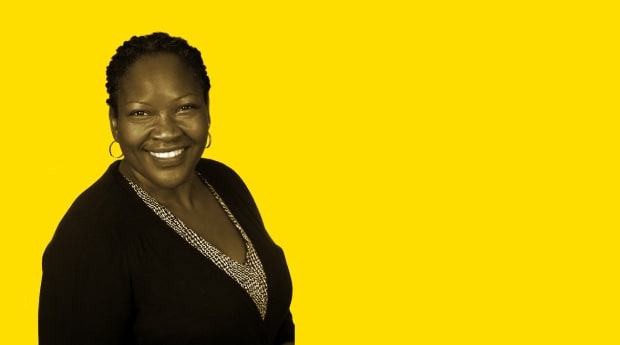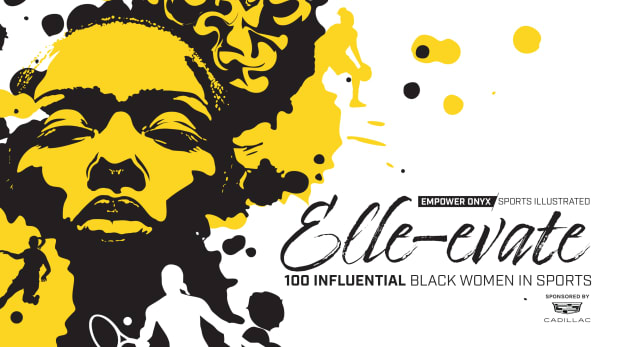The CEO of the Ross Initiative in Sports for Equality has a tough task ahead of her, but she’s never been one to back away from a fight.

Courtesy of Diahann Billings-Burford
Sports Illustrated and Empower Onyx are putting the spotlight on the diverse journeys of Black women across sports—from the veteran athletes, to up-and-coming stars, coaches, executives and more—in the series, Elle-evate: 100 Influential Black Women in Sports.
Diahann Billings-Burford is not a woman who’s easily intimidated. Not now. And not in high school, either.
Back in the mid-1980s, when race relations in New York were trending toward an inflection point following the ’89 murder of 16-year-old Yusef Hawkins, she was the only Black player on Brooklyn Poly Prep’s girls field hockey team. Let her tell it, she was pretty handy with a stick, a natural obstacle at sweeper. But her life nearly took a turn for the worse after one play. “It was against this school on Staten Island,” Billings-Burford recalls. “This girl was trying to be on a fast break, but I got to the ball before her. Her teammate says to her, ‘Don’t even try that Aunt Jemima n-----.’”
Things quickly turned. She stopped the game to confront the girl, drawing a yellow card. The benches cleared, and the altercation between the teams spilled into the locker room and sucked in some spectators, too. But the thing that sticks with her, besides her obliviousness to how outnumbered she was, is the unquestioned support of her white teammates and coaches. “Without even really knowing what had happened, they were like, ‘That’s not cool,’” Billings-Burford says. “In retrospect I was able to see that having those real relationships with folks, and especially being on a team with folks—it can get us to this point of unity when faced with issues of race and racism.”
It’s a moment that informs her current role as CEO of a concierge diversity and inclusion resource for amateur and pro-sports organizations called Ross Institute in Sports for Equality (RISE). The Ross here is Stephen Ross, the Miami Dolphins owner whose decades-long friendship with Donald Trump met consternation from Black NFL players who believed the then president to be racist. In 2015 Ross established RISE with the aim of eradicating racial discrimination in sports through education and empowerment; five years later he further committed $13 million over the next four years.
Chump change for a mighty big problem, some might say. But Billings-Burford says pushing Ross for less help is what will ultimately make RISE more effective over the long term. The organization’s current transition from a private foundation to a 501(c)(3) charity is not only a critical step toward independence but also a wider buy-in. “We really stand on the fact that this effort has to come from a coalition that goes across race, across gender, across sport,” she says. “We need folks to understand that this is a pressing issue.”
Another high school sweeper might be able to trace Billings-Burford’s oath from Poly Prep to RISE in one high-arching pass. But it’s her work in the education and service communities that’s the actual through-line in her career, and it hasn’t been the straightest. After earning a bachelor’s degree in psychology from Yale and a law degree at Columbia, Billings-Burford alternated as a college prep school counselor, corporate attorney and a charter school grant writer before finding a home in Michael Bloomberg’s New York mayoral administration as the city’s chief service officer. Subsequently, as Time Warner’s executive director of cultural investment and vice president of the Time Warner Foundation, she led the company’s college internship program, oversaw its community engagement activities and directed the grant-making operations.
All of these skills come to bear at RISE, which has a multifaceted approach that ranges from general awareness campaigns to strategic planning to actual classes on diversity and inclusion. RISE’s board of directors—a who’s who of industry heavyweights that include NASCAR president Steve Phelps, MLB chief Rob Manfred and NFL commissioners Roger Goodell and Paul Tagliabue—gives the organization (which claims nearly 500 partners across sports) a reach that is broad, powerful and deep.
When Jerry Richardson was stripped of his ownership stake in the Carolina Panthers in 2017, after SI revealed that four former employees had received “significant” financial settlements because of his sexually inappropriate and racist workplace behavior, Goodell drafted a memo mandating diversity training for all 32 clubs, recommending that they work with RISE.
While Billings-Burford says that RISE’s collaborations with NFL teams have been well attended by senior managers, they’re still not drawing team owners. And after yet another coaching cycle that has flushed out all but one of the league’s Black coaches, it’s team owners who could most benefit from lessons on “implicit bias” and other RISE sessions.
But RISE at least can count on support from board members like Tagliabue, who helped draft the Rooney Rule and sees the gap between league policy and the owners’ implicit bias as something that can only be closed through tough lessons and hard conversations. “He’s like, ‘Diahann, of course, it’s less effective; it’s outdated,’” Billings-Burford says, quoting the ex-commissioner’s views on an affirmative directive that’s almost 20 years old. “‘They have to come up with something that the current owners own, the way we owned the Rooney Rule.’”
Purging racism from sports is a lofty goal. Some might say it’s damn near impossible. At the very least, it’s intimidating work. But Billings-Burford isn’t blinking. If anything, she’s rolling up her sleeves and urging on the fight.

Andrew Lawrence is a contributor for Empower Onyx, a diverse multi-channel platform celebrating the stories and transformative power of sports for Black women and girls.